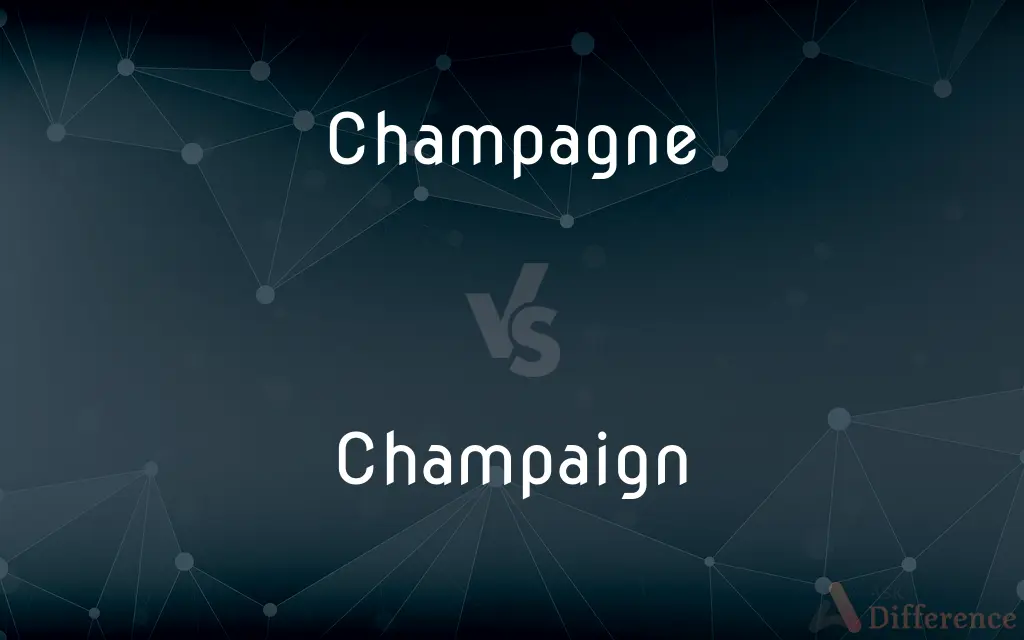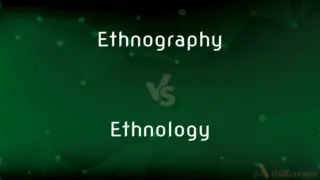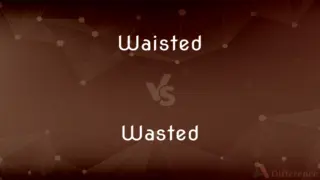Champagne vs. Champaign — What's the Difference?
Edited by Tayyaba Rehman — By Fiza Rafique — Updated on October 29, 2023
Champagne is a sparkling wine from France, while Champaign is a flat, open countryside or the name of a city in Illinois.

Difference Between Champagne and Champaign
Table of Contents
ADVERTISEMENT
Key Differences
Champagne and Champaign, despite their phonetic similarities, refer to completely different things. Champagne is renowned as a sparkling wine originating from the Champagne region of France. Only the sparkling wine produced in this specific region can legally be labeled as "Champagne." Champaign, on the other hand, does not relate to any beverage. It denotes a flat, open countryside.
The production of Champagne involves a meticulous process, utilizing specific types of grapes and fermentation techniques. The effervescence of Champagne is achieved through secondary fermentation in the bottle. Champaign, in its geographic meaning, evokes images of vast expanses of open land, often used for farming.
In another context, Champaign is also the name of a city in the state of Illinois, USA. It's known for being the home of the University of Illinois. While Champagne's reputation is global due to its association with luxury and celebration, Champaign is primarily recognized within the context of the American Midwest.
When using the word Champagne, one often thinks of celebrations, luxury, and special occasions, given the drink's prestigious reputation. Champaign, when not referring to the city, conjures images of rural landscapes and vast fields.
It's essential to use these terms in their correct contexts to avoid confusion. While they sound similar, mixing them up can lead to significant misunderstandings, given their distinct meanings.
ADVERTISEMENT
Comparison Chart
Nature
Alcoholic beverage
Geographic term or city
Origin
Champagne region, France
Refers to flat open land or a city in Illinois
Association
Celebrations, luxury
Countryside or higher education (due to University of Illinois)
Usage
Specific to sparkling wine from France
Describes land or specific U.S. city
Contextual Relevance
Widely recognized globally
Known in geographic or U.S. regional contexts
Compare with Definitions
Champagne
A type of wine that undergoes fermentation twice.
The bubbles in Champagne come from its second fermentation.
Champaign
A city in the state of Illinois.
The University of Illinois is located in Champaign.
Champagne
A drink often associated with prestigious events.
Champagne is a staple at many high-end parties.
Champaign
A term older in usage, less common today.
The poet described the champaign bathed in morning light.
Champagne
A wine with a distinct geographic indication.
Not all sparkling wines can be labeled as Champagne.
Champaign
Refers to level, open land.
The farmhouse was surrounded by miles of champaign.
Champagne
A sparkling wine from the Champagne region of France.
He opened a bottle of Champagne to celebrate.
Champaign
A university town in east central Illinois adjoining Urbana
Champagne
A symbol of luxury and celebration.
They toasted their anniversary with Champagne.
Champaign
A flat, open countryside.
The champaign stretched out as far as the eye could see.
Champagne
Champagne (, French: [ʃɑ̃paɲ]) is a sparkling wine produced in the Champagne wine region of France under the rules of the appellation, that demand specific vineyard practices, sourcing of grapes exclusively from designated places within it, specific grape-pressing methods and secondary fermentation of the wine in the bottle to cause carbonation. The grapes Pinot noir, Pinot meunier, and Chardonnay are used to produce almost all Champagne, but small amounts of Pinot blanc, Pinot gris, Arbane, and Petit Meslier are vinified as well.
Champaign
Open level countryside.
Champagne
A former province of north-eastern France that now corresponds to the Champagne-Ardenne administrative region. The region is noted for the white sparkling wine first produced there in about 1700.
Champaign
A stretch of level and open country; a plain.
Champagne
A sparkling white wine made from a blend of grapes, especially Chardonnay and Pinot, produced in Champagne.
Champaign
Open countryside, or an area of open countryside.
Champagne
A similar sparkling wine made elsewhere.
Champaign
(obsolete) A battlefield.
Champagne
A pale orange yellow to grayish yellow or yellowish gray.
Champaign
Pertaining to open countryside; unforested, flat.
Champagne
A sparkling white wine made from a blend of grapes, especially Chardonnay and pinot, produced in Champagne, France, by the méthode champenoise.
Champaign
A flat, open country.
Fair champaign, with less rivers interveined.
Through Apline vale or champaign wide.
Champagne
Any sparkling wine made by the méthode champenoise.
Champaign
Flat; open; level.
A wide, champaign country, filled with herds.
Champagne
Any sparkling white wine.
Champaign
Extensive tract of level open land;
They emerged from the woods onto a vast open plain
He longed for the fields of his youth
Champagne
(countable) A glass of champagne.
Champaign
A word unrelated to any drink or beverage.
Unlike Champagne, Champaign does not fizz or bubble.
Champagne
(countable) A very pale brownish-gold colour, similar to that of champagne.
Champagne
(heraldry) champaine
Champagne
Of a very pale brownish-gold colour, similar to that of champagne.
Champagne
(heraldry) champaine
Champagne
(transitive) To ply or treat with champagne.
Champagne
(intransitive) To drink champagne.
Champagne
A light wine, of several kinds, originally made in the province of Champagne, in France.
Champagne
A white sparkling wine either produced in Champagne or resembling that produced there
Champagne
A region of northeastern France
Common Curiosities
Can Champaign refer to a beverage?
No, Champaign is either flat open countryside or a city in Illinois.
What's prominent in Champaign, Illinois?
The University of Illinois is a notable institution in Champaign.
Does Champaign have any relation to wine?
No, Champaign does not refer to any type of wine or drink.
Is Champagne always alcoholic?
Yes, Champagne is an alcoholic sparkling wine.
Is Champaign a common term for flat land?
It's an older term and less commonly used today to describe flat land.
Can sparkling wine from California be called Champagne?
No, only sparkling wine from the Champagne region in France can use that label.
Is Champagne only from France?
Yes, only sparkling wine from the Champagne region of France can be labeled "Champagne."
Why is Champagne associated with luxury?
Its unique production process and historical association with celebrations make it a luxury symbol.
Are the production standards for Champagne strict?
Yes, there are strict regulations for a wine to be labeled as Champagne.
How large is Champaign, Illinois?
Champaign is a moderately-sized city, known mainly for the University of Illinois.
Can you use "champagne" generically for all sparkling wines?
It's incorrect to do so; only sparkling wines from Champagne, France, should be called "Champagne."
Is Champaign, Illinois, named after the open countryside meaning?
It's possible, as "champaign" means flat, open country.
Which is more popular: Champagne or Champaign?
In global context, Champagne is more recognized due to the drink's popularity. Champaign is primarily known in U.S. regional contexts.
Does Champaign have any other meanings besides land and the city?
Primarily, Champaign refers to flat open land or the city in Illinois.
How is Champagne served?
Champagne is best served chilled, often in a tall, narrow glass.
Share Your Discovery

Previous Comparison
Ethnography vs. Ethnology
Next Comparison
Waisted vs. WastedAuthor Spotlight
Written by
Fiza RafiqueFiza Rafique is a skilled content writer at AskDifference.com, where she meticulously refines and enhances written pieces. Drawing from her vast editorial expertise, Fiza ensures clarity, accuracy, and precision in every article. Passionate about language, she continually seeks to elevate the quality of content for readers worldwide.
Edited by
Tayyaba RehmanTayyaba Rehman is a distinguished writer, currently serving as a primary contributor to askdifference.com. As a researcher in semantics and etymology, Tayyaba's passion for the complexity of languages and their distinctions has found a perfect home on the platform. Tayyaba delves into the intricacies of language, distinguishing between commonly confused words and phrases, thereby providing clarity for readers worldwide.













































